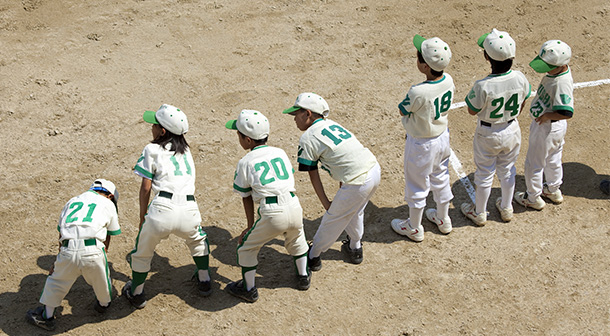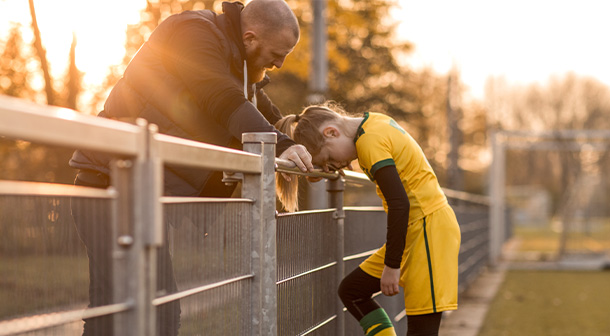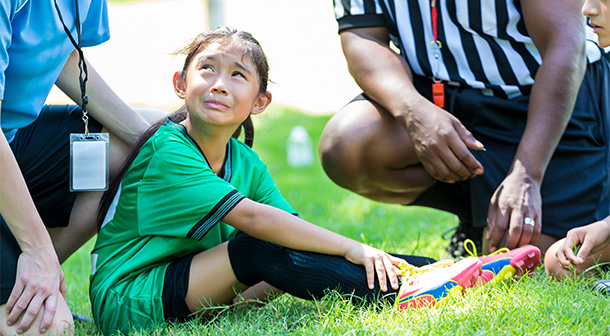How to Make Children's Sports a Win-Win
By GetParentingTips.com staff
Read Time: 9 Minutes
Children’s sports can be great for kids’ physical and mental health - and a lot of fun. Research shows that when kids love playing sports, they’re more likely to stay active throughout their childhood. No matter their age, kids can get involved in children’s sports through different organizations like a local YMCA, schools, or community leagues. Below are some benefits your children can get from participating in children’s sports:
- Help kids develop leadership skills.
- Increase kids’ physical fitness, coordination, and movement.
- Help children learn about teamwork and building relationships with kids who have personalities different from theirs.
- Teach kids the value of discipline and responsibility. With hard work, commitment, and practice, they can achieve their goals.
- Help kids gain pride and self-esteem as they develop new talents.
- Teach kids time management as they learn to balance practice and game schedules with homework and other responsibilities.
- Help kids develop a healthy outlook on winning and losing.
- Teach kids how to overcome obstacles and succeed after failure.
- Help you and your child build a deeper bond as you support them in sports activities.
The benefits of playing children’s sports can last a lifetime. Here are some tips on how to support your young athlete.

Supporting Your Child in Sports
Encourage any interest they show in children’s sports
Kids encounter sports in all kinds of ways. Maybe they saw some cool karate moves in a cartoon they love or went to a local baseball game and saw someone hit a home run. Now it’s all they can talk about! As a parent, you can help encourage your child’s new passion by talking to them about sports benefits and sharing in their excitement. You can also give them materials like books or videos to help them understand how games work.
Sign them up
If your child feels ready to play on a team, ask if they’re interested in joining a league. Reach out to other parents, teachers, or community members to find out if there’s one near you or visit your local YMCA or club and ask about signing up for children’s sports. You can also ask your kids whether they have any friends that might want to join them.
Be a cheerleader
Attend games and cheer them on! If your child knows you’re excited about them playing a sport, it can help build their confidence and self-esteem. Whether they win or lose, encourage them at the end of a game and talk to them about how it went. Ask them questions like, “What was your favorite part of playing?” or “What parts of the game were hard?” Your enthusiasm for children’s sports can help them feel good about what they’re doing even when they don’t feel they were at their best.
Practice with them
Even if you don’t play their sport, you can spend time with them by helping them practice. Take a soccer ball into the yard and kick it around. Go to a public tennis court and hit balls just for fun. And always encourage them to keep at it if a particular move or play is challenging for them. They might even enjoy teaching you a thing or two! Being involved in children’s sports is a great way to build a stronger relationship with your child and spend quality time together.
Children’s sports can open many doors for your kids and the entire family. Many lifelong friendships have been built through sports.
Encourage friendships with other team members
Kids tend to make friends with kids who share things in common. Children’s sports are a great chance for them to make new connections. Loving the same sport, making friends with team members, and feeling a sense of unity are all important to a child’s emotional development. When your child joins a team, encourage them to build relationships with their teammates - they might just find some tried-and-true friends!

Teen Athletes and the Benefits of Playing Sports
Encourage your teen athlete
If your teen is just now developing an interest in sports, great! It’s never too late to try something new. Talk to them about the benefits of playing sports and how it can be a great chance to learn new skills and meet new friends. Talk about the pros and cons and support whatever path they decide to take. They may decide to try out for a school team or join a community league. Help them understand the time and commitment each type of program will require. If they’re already involved in one sport but want to take on another, help them decided whether it’s a good idea. Go to a game together and talk to other parents and teens who are involved in that sport. Playing more than one sport can be great for many teens, but it can also be too much for some. Make sure this extra activity works for your family’s schedule and that your child can manage the commitment. Whether your kids are new to sports or not , it will mean a lot to them to see you involved and encouraging them to pursue their interests.
Be supportive and listen to their concerns or frustrations
When your child is feeling down about a loss or a bad practice, help them process their feelings. Listen to what they think they did wrong and help them understand what they could have done differently and that things don’t always turn out the way we want. One of the many advantages of playing sports is that it helps kids develop problem-solving skills - skills that will help your child not only in their games but throughout their life.
Teens often have complicated emotions as they begin developing a sense of individuality and self-worth. Sports can make these emotions even stronger - even overwhelming at times - when kids compare themselves to others. If your teen athlete starts to get frustrated with their performance or the sport becomes a consistently negative thing, talk to them about it and listen to what they have to say. They still need your guidance and support to help them keep a healthy perspective. Children’s sports should build skills, confidence, and even character. When the negatives outweigh the positives, then it’s time to talk to your teen about moving on.
Attend games and practices
Bringing families together is one of the great advantages of sports. By attending your teen’s games and even practices you’re showing that you support them, which can give them more confidence when they’re playing. Practicing with them and working on their skills will also help build their talents and your relationship. Even if you don’t have experience with the sport, listening to your teen’s challenges and just showing up lets them know you’re there to support them.
Develop a relationship with their coach
Coaches of children’s sports can be positive role models. Having a good relationship with you teen’s coaches can benefit both you and your teen. A coach plays a big role in helping teammates develop mentally and physically, which can have positive effects on and off the field. Parents should talk to coaches to better understand how their teen is doing with the sport and how well they engage with teammates. Understanding how your teen takes direction and criticism can also help you address any challenges they may be having.

Be on the Lookout for Sports-Related Issues
Although there are many advantages of sports, you should also watch out for potential problems. Bullying, burnout, and physical challenges or limitations are a few that parents should keep an eye out for.
Athletic Bullying
Athletic bullying happens when one or more team member sets out to intentionally hurt another team member. It can be verbal such as trash talk, name calling, or even threats. It can also be physical, on or off the field. Examples include tripping, hitting, slapping, or head butting - any unwanted contact. No matter the reason, bullying is never okay. As a parent, you have the right to speak up if you see signs that your or another child is being bullied. Some signs that suggest there may be a bullying issue are:
- A sudden loss of interest in the sport.
- Behavior changes, such being upset or withdrawn.
- Physical injuries that aren’t consistent with minor bumps or scrapes that might happen during a typical game or practice.
- Avoiding certain teammates.
How can you help if you think your child is being bullied? Start by talking to them to get more information about what’s going on. Find out whether they still enjoy being on the team and, if not, why? Ask whether they’ve ever seen anyone on the team being treated unfairly. Reassure them that you’re always there if they want to talk more about it. If your child wants you to stay out of it, then be sure to stay in touch with them to see whether there’s improvement. Help them set and communicate boundaries with others and encourage them to ask for help if anyone crosses those boundaries. If the bullying doesn’t stop, then it’s time for you to step in and talk to the coach or teacher.
Need parenting help now?
The Texas Parent Helpline is available 24/7.
- Call 833-680-0611
- Chat with us
- Text 833-680-0611
Burnout in children’s sports
While developing a strong work ethic and a passion for teamwork are great advantages of children’s sports, sometimes the commitment can become too much. Overtraining, pressure from coaches, demands from parents, and being a perfectionist can lead to burnout. Burnout occurs when there is physical and/or mental overload. Kids can also experience burnout if they have numerous disappointing performances. They might see recent losses as a reflection of their abilities - or the team’s - and feel uninterested in continuing with the sport. So how can you help them?
- If your child wants to quit the team because they aren’t winning, encourage them to stick with it. Help them understand that it’s important to do their best, and that it isn’t just about winning the game. They can continue to work on building their skills and offer to help teammates who might need some extra support.
- Talk to them openly about how they’re feeling. If they have mentioned quitting, are they ready to give up the sport or do they just need a break? Find out why they want to quit. Is it the sport, the team, the coach, the commitment, or their ability? Discuss what’s possible and look at options - maybe it’s the end of the season so they can take a break from sports to recharge.
- If it’s truly time to move on, encourage them to explore other hobbies. Help them find the activity that will bring them joy and confidence. It may or may not be sports. Other group activities such as band, choir, or debate clubs may suit your child better. Your child may prefer more independent activities like reading, writing, or art.
- Support their decision if they decide to give up the sport. Often parents pressure their kids to stay in children’s sports because they believe it’s the right thing for the child. Make sure that you and your child are communicating with each other and you’re hearing and understanding their needs.
Too much parental pressure
The benefits of playing sports are great, but there can be downsides. Sometimes parents push too hard and put pressure on kids, intentionally or unintentionally, to work harder or play better. This can put serious stress on them and take the fun out of playing. Make sure you do your best to keep the sport fun for your kids and manage your own emotions if they don’t perform perfectly.
Know how to support your young athlete
You should have frequent self-check-ins to determine how involved you are in children’s sports. It’s important to be supportive and encouraging, of course. But if you find yourself scolding them for a loss, offering advice when it may not be needed, or being negative about their performance, it is time to step back and rethink your involvement.

Safety Concerns in Children’s Sports
Before your child begins playing a sport, be sure to address the safety concerns first.
Here are some questions to ask yourself.
- Do your kids have proper sports gear to keep them safe, such as helmets, shin guards, mouth guards, or sunscreen?
- Did your kids get physicals and/or a clean bill of health before they started playing?
- Will a coach or other adult be properly supervising games and practices in case someone gets injured?
- Are kids staying properly hydrated before, during, and after each practice or game?
- Do you have a plan for getting medical attention in case your child is injured?
Frustration in Children’s Sports
It’s normal for children to experience a certain amount of frustration when they have a rough day playing sports. However, sometimes frustration can build for a different reason. The more kids play, the more they may realize that there is a difference between their love of the game and their actual athletic ability. They may get mad or upset if they feel they aren’t as good as other teammates or that they’re not improving as much as they want. Be sure to listen to them if they experience this kind of frustration and reassure them that their athletic limitations do not reflect on them as a person. Remind them that their self-worth should not be wrapped up in how good they are as a player. Point out their strengths and what they’re doing well in the sport and beyond.

The Advantages of Sports
Children of all ages can enjoy the benefits of playing sports. From helping kids develop teamwork skills and confidence to increasing their physical activity, the advantages of sports can continue throughout childhood and into adolescence. As long as your child is staying safe and having positive experiences, encourage them to participate. With open and honest communication, families can create special memories and relationships through children’s sports. And that can be a win-win for everyone.




